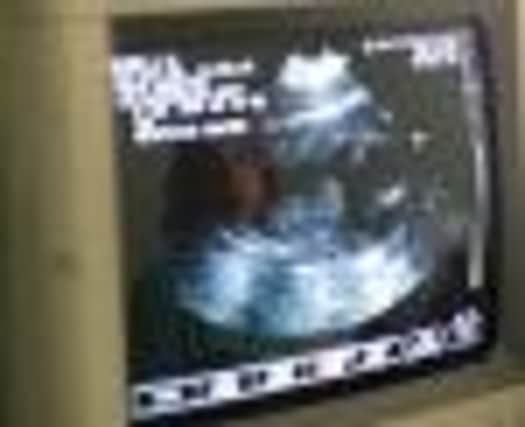Simple hormone test can tell women if they’ll suffer miscarriage


The test, which measures the hormone progesterone, could be used in women with pain or bleeding to predict accurately whether or not a pregnancy is viable.
Bleeding occurs in about a third of women in early pregnancy, and doctors currently use ultrasound to see whether the foetus is viable or not.
Advertisement
Hide AdAdvertisement
Hide AdBut ultrasound tests can be inconclusive, said the University of Birmingham-led researchers in a paper published yesterday.
The team of UK and Dutch researchers set out to determine the accuracy with which a progesterone measurement in early pregnancy can discriminate between a viable and a non-viable pregnancy. They analysed the results of 26 studies involving 9,436 pregnant women and concluded the hormone test could help, if used with other diagnostic techniques.
The most recent figures stated there were 5,708 miscarriages in Scotland in 2010 – or 15 every day – down from 7,028 a decade earlier.
A public petition open at the Scottish Parliament from the group Scottish Care & Information on Miscarriage (SCIM) is calling for a review of testing.
At the moment, only women who have three consecutive miscarriages in the first trimester are offered testing, or women in the second trimester, according to the petition.
Ruth Bender-Atik, national director of the Miscarriage Association, said that any test would need to be 100 per cent accurate.
Ms Bender-Atik said: “It’s all useful science and it’s possible that it might have practical applicability in cases where ultrasound facilities are not immediately available, such as out-of-hours or in A&E – though you would still need excellent clinicians who can interpret the results.
“An extra test that can help to predict the outcome may be welcomed, as in being prepared somewhat for the worst.
Advertisement
Hide AdAdvertisement
Hide Ad“But unless and until it is a certainty, or unless there is a strong likelihood of ectopic pregnancy, this may not make an appreciable difference to their experience or to the outcome.”
In the analysis of previous studies, the researchers looked at seven studies with women suffering pain or bleeding and an inconclusive ultrasound assessment, while 19 studies looked at women with pain or bleeding alone.
The results show that a single low progesterone measurement for women in early pregnancy with bleeding or pain can discriminate between a viable and a non-viable pregnancy when an ultrasound investigation proves to be inconclusive.
For women with pain or bleeding who did not have an ultrasound, the progesterone test was less accurate in predicting viability of a pregnancy.
But the researchers stress that low progesterone levels may occur in some viable pregnancies.
They conclude: “The test should be complemented by another test to increase its diagnostic accuracy.
“This test is highly accurate when complemented by ultrasound and could be added to the existing algorithms for the evaluation of women with pain or bleeding in early pregnancy as it can accelerate diagnosis.”
The study was published at bmj.com.